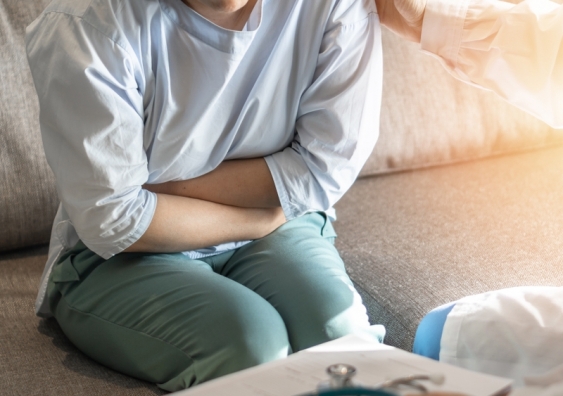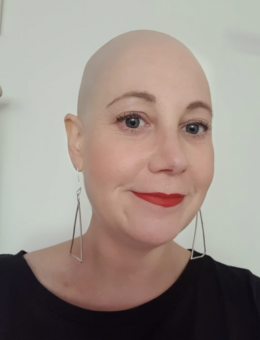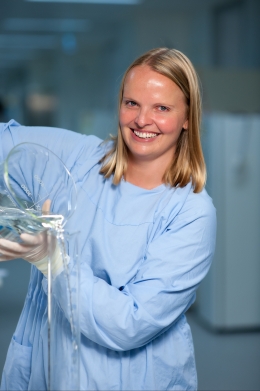We need to talk about ovarian cancer, our deadliest gynaecological cancer
It’s time to improve treatments and raise survival rates for people with ovarian cancer, says an honorary academic from UNSW Arts, Design & Architecture.
It’s time to improve treatments and raise survival rates for people with ovarian cancer, says an honorary academic from UNSW Arts, Design & Architecture.

We must urgently increase research funding and awareness of ovarian cancer if we want to improve survivability for future generations, says an honorary academic at UNSW Sydney. Ovarian cancer has been left behind in the last 45 years of modern cancer research. It has the lowest survival rate of all gynaecological cancers, yet inequities in our healthcare system have seen it chronically underfunded, says Associate Professor – and ovarian cancer patient – Siobhan O’Sullivan.
“The five-year survival rate for ovarian cancer is stubbornly low [at 48%], while great advances have been made in the survivability of many other cancers,” she says. “We need funds. We need research. And we need solutions now so we can draw a line under this insidious, relentless disease.”
Greater awareness will help drive greater investment, and increased research funding will improve detection, treatment and support for people diagnosed with ovarian cancer, she says.

Associate Professor Siobhan O'Sullivan
A/Prof. O’Sullivan is a political scientist and theorist whose research focuses on animal welfare policy and the welfare state. While academia has been a vocation for her, she has retired early from UNSW’s School of Social Sciences. A/Prof. O’Sullivan has terminal ovarian cancer. She has been advocating for improved outcomes for people with ovarian cancer since her stage III diagnosis in August 2020.
Despite enduring non-stop treatment over the last two and a half years, A/Prof. Sullivan did not make it to remission; she is now in out-patient palliative care. She has had all the chemotherapy currently available to treat ovarian cancer, as well as a chemotherapy drug intended to treat breast cancer, she has had fifteen rounds of radiotherapy, and is having a second course in April and May, and she has taken part in a drug trial. But heartbreakingly, her cancer has spread to her abdomen, chest and liver.
Unlike screenings for cervical, bowel and breast cancer, there is no early detection test for ovarian cancer. “Often, it feels like nothing. For that reason, most women are diagnosed when they are Stage III or IV,” A/Prof. O’Sullivan says. For many, late diagnosis is a death sentence; only 29% of women diagnosed at a late stage (III or IV) will survive past five years.
A/Prof. O’Sullivan was diagnosed following Sydney’s first COVID lockdown; she’d started attending a local bootcamp and was getting stronger, but began to feel “bloated”, “heavy”, “just not right”. She put it down to COVID weight gain – its redistribution around her middle perhaps a sign of ageing – and the emotional stress of navigating her father’s rapidly deteriorating health.
When she visited her local general practice, she was misdiagnosed with constipation. Four days later she returned feeling physically incapacitated and highly distressed; she was sent for blood tests “to rule out the worst options”. Her CA-125 levels, a proxy marker for ovarian cancer and other endometrial issues, came back highly elevated (~470, with normal levels below 25). Her doctor sent her directly to emergency.
After a CT scan, an emergency physician told her, “Your life is going to change forever. You have ovarian cancer.” A/Prof. O’Sullivan was not aware an ovarian cancer diagnosis was very often terminal; this speaks to the lack of education around the disease, she says.
She would spend the next few weeks at Chris O’Brien Lifehouse due to a debilitating nausea condition, leaving just briefly to visit her father one last time. He passed shortly after her visit, at which she was accompanied by her mother and brother. She was back in hospital the following day, once again overcome with nausea. But the treatment team held off her first round of chemotherapy so she could attend her father’s funeral, held a few days later.
She underwent four rounds of chemotherapy before seven-and-a-half-hour surgery. Unfortunately, she suffered two strokes – one during surgery and one post-op – leaving her partially blind.
“Also, when they cut me open, my surgeon saw something that she had never seen before. The cancer lower in my abdomen had shrunk during chemo, but the cancer higher up had continued to grow aggressively,” she says. “At first my surgeon thought that perhaps they were dealing with two different cancers. But no. Tests revealed it all to be ovarian cancer.”
The mystery was later resolved when her treating team concluded that she is chemo refractory, or non-responsive to chemotherapy. People who are chemo refractory, and suffering from ovarian cancer, are normally given a year to live. A/Prof. O’Sullivan has outlived expectations, but she says these kinds of prognoses need to change.
“My oncology team are just trying to do whatever they can,” she says. “I don't want to suffer too much but I still have enough quality of life that I want to try to live a bit longer, if I can.”

Professor Caroline Ford
Ovarian cancer symptoms are often dismissed as a normal part of perimenopause and menopause, which makes an early detection test ever more critical, says Professor Caroline Ford from UNSW Medicine & Health.
“Symptoms can include pelvic pain, bloating, weight loss or gain, changes in toileting and feeling full very quickly… Everyone has fluctuations in these things, feels tired or bloated or has weight gain. When these symptoms persist for more than a week or two, people should see their doctor.”
Prof. Ford leads UNSW’s Gynaecological Cancer Research Group (GCRG) that aims to understand why gynaecological cancers (cancers of the female reproductive system) develop, how and why they spread, and how best to treat them. Its current focus is ovarian and endometrial cancers.
Prof. Ford and her team are developing an early screening test that detects circulating tumour DNA in blood. In the last 12 months, they have identified strong candidate biomarkers, bringing their research closer to clinical trials.
They are also developing additional treatments for those already diagnosed with ovarian cancer, including the repurposing of drugs that have already been developed and shelved.
“Using AI technology, we can look at, for example, a heart disease drug and see if it might hit a target that's important in ovarian cancer,” she says. “Rather than starting from square one and taking the typical 15 to 20 years to take it through laboratory work to clinical trials, we can build on thousands of drugs that are available with well-known safety profiles and see if they can help women with ovarian cancer in the next few years.”
Screening and new treatments would allow people like A/Prof. O’Sullivan a greater chance of earlier diagnosis and recovery.
A/Prof. O’Sullivan is currently home, surrounded by family, friends, and her two rescue cats, Gracie and Tom Tom. “I look at the fact that I’m not in hospital as a gift,” she says, allowing her to vie for victory at her local trivia, snorkel at Clovelly and spend time with her loved ones.
Advocating for increased funding and awareness helps to give her meaning and purpose, she says. She works with Survivors Teaching Students to help tomorrow’s health professionals better understand the experience of ovarian cancer, and she is writing a book about cancer and navigating oncology systems with co-authors Scientia Professor Louise Chappell and Dr Naama Carlin from UNSW, who have also experienced cancer firsthand. The researchers are conducting interviews with people impacted by cancer to share diverse perspectives, she says.
After the relentless treatment and experience of the disease, she would like to decide when she has suffered enough. Together with Go Gentle Australia and other organisations, she lobbied for the Voluntary Assisted Dying law reform, that comes into effect in New South Wales from November.
She says the taboo around speaking about death needs to change – in both social and medical spheres – so impacted people can make informed decisions about their lives.
“I have survived longer than anybody thought possible yet it's too late for me. Ovarian cancer will take my life. But I'll be damned if the next generation die too,” she says. “Research is essential and urgently needed. I will support that research via my will.
“I am doing it for people like my niece. We need urgent action now. Hope is out there. There are green shoots, but we need [research] money now so we can get the results we need and save lives.”